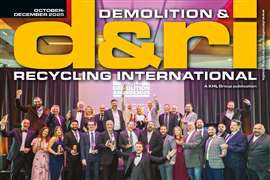The service shake out: What do rental companies think about aftersales support
24 August 2010
One of the positive knock-on effects of the recession has been that manufacturers have had a chance to look at all aspects of their business. Many have realised that in the face of long backlogs and in the drive to get product out of the door some of the additional services were overlooked.
With order books low there has been time to re-examine service and support and manufacturers are claiming that they are now able to offer a more consistent and customer focused facility, which will not be compromised when the upturn brings back full production.
As the "improved" service rolls out, we asked rental companies from around the world about their experiences.
Some rental companies prefer to buy equipment from a limited core of manufacturers because they feel it helps them build and maintain better relationships with suppliers. Henri Kopsala and Juha Huhtala of Finnish rental company Pekkaniska said, "We like to know the products we rent out. If you have a wide range of suppliers you lose that knowledge."
A limited product range can also make it easier to handle maintenance and repair. Chilean company Alo runs a fleet of 400 machines - mostly JLG and Genie, Sandra Franco the company's marketing manager said, "We prefer to stick to a small core of suppliers. It is easier to keep our technical and sales people trained and better prepared for our own after service and support."
Marc Chemineau, director general of operations at French rental company Acces Industrie is of a similar opinion about his 4000 strong access fleet, "We stick to a small core of suppliers," he said, "to optimise maintenance operations."
Mick Leddon, group operations director of Lavendon Group said that the company is moving towards a small core of suppliers, "It provides volume discount, aftersales and service cost reductions and is easier to manage tooling, training and parts inventory," he said.
However there is another school of thought that likes to choose machines from a wide range of sources, Tim Richards of Middle East rental specialist AL Laith said, "We carry a mixed range of equipment because , not one manufacturer has the market demand covered. Some products like Omme are quite specialised and allow for niche market applications. We also find advantages for commercial reasons."
Rental companies can receive support directly from the manufacturer or dealers, depending on their size, preferences and location. Rental cooperative organisation System Lift, based primarily in Germany, buys from both but makes a point of only choosing dealers with a good reputation for support.
Tim Richards AL Laith said, "We receive support from the manufacturers: being in the Middle East manufacturers tend to support us rental companies direct.
"Because we are where we are there are not so many dealers and those that are here tend not to be very good or equipped with spares and enough skilled staff or, they are like us and rental companies who sell. So we tend to go direct and look after ourselves."
Warrenty compliance and manufacturers' knowledge of their own equipment are reasons to go direct to the producer on service and support. Service contracts can also form part of purchase negotiations, particularly in these difficult times. However, good dealers can greatly support smaller rental organisations whose own maintenance and engineering departments maybe under pressure.
Spare parts are now available from a variety of sources, some manufacturers are carrying competitors' parts in their stores to try and provide a one-stop shop for customers and there are also the independent part specialists.
The rental companies are making the most of these options, Marc Chemineau of Acces Industrie said, "We buy from manufacturers, third parties and direct from parts manufacturers for cost optimisation"
Tim Richards of AL Laith said, "We generally buy from the manufacturer but also from third parties within and outside the access industry. i.e engine parts or readily available common "off the shelf" parts are bought wherever available locally.
"This is for practicality and commercial reasons, we can't afford to wait for a part not in an agency or manufacturer's stock that could be purchased locally, used and revenues maintained for getting the unit back on track. Although warranty issues can play a part in the source of part."
Alo, however prefers to go direct to manufacturers, Sandra Franco said, "We prefer to purchase original spare parts and we have special dealer discounts and conditions."
Online parts ordering has been a huge step forward for many rental companies and most are happy with the speed and efficiency of delivery. Location of the rental company does, however, have a baring on delivery, Alo based in Chile would like, "A just in time response in service and less spare parts back orders." And AL Laith in the Middle East wants, "More regional manufacturers and technical representation."
Lower prices, lower lead times, less mistakes and better spare part manuals were also improvements the rental companies would like to see.
In terms of resolving technical issues on the whole customers are satisfied with the level of expertise and response times offered. Manning levels on technical help desks were questioned, as response times can slow down if the department is stretched and the importance of multi-lingual technical help to ensure clear communication was raised.
Out of hours support appeared to be an issue and rental companies would like to be able to speak to a person when problems arise.
Sandra Franco said, "Due to the distance, we suggest more technical training from the manufacturers to their dealers abroad so they can be competent enough to solve technical problems themselves. Manufacturers have to trust their own dealers abroad and believe that when we say there is a problem, there is a problem."
There were some strong reactions to the accuracy of invoicing and delivery with some companies happy with speed and correct fulfillment of orders and others very dissatisfied. Mick Ledden of Lavendon said that invoicing standards were sporadic and could be, "significantly" improved.
Marc Chemineau was satisfied with some suppliers but said Acces industrie had experienced, "mistakes in JLG invoicing, which were time-consuming to fix them due to JLG organisation (split between operations and finance)."
Access to literature on-line appears to be a popular development. Sandra Franco said, "Lately everybody is trying to manage through internet , so a good and complete webpage from the manufacturers is a good tool for dealers, dealer's own web page and finally, the end user .We always insist on local language : manufacturers that want to sell in Latin America should provide Literature and web pages in Spanish."
Tim Richards said he would like to see more detailed information from some manufacturers.
Training of rental companies' maintenance departments was thought to be essential, particularly on the more complex units. The quality of this training was generally praised for its professional delivery, and technical knowledge.
Increased frequency of training was asked for, Mick Leddon of Lavendon said, "It takes too long to organise, it OK if it's for English speakers, but needs better support in France, Spain and the Middle East."
Henri Kopsala and Juha Huhtala of Pekkaniska suggested that manufacturers might offer these services as a matter of course and without incurring extra costs and Marc Chemineau would like a better follow-up of service bulletins.
In the current climate what sort of help are rental companies getting with financing new machines? Credit is hard to come by but manufacturers are attempting to offer help Marc Chemineau of Acces Industrie particularly praised JLG for its, "innovative and open-minded approach to alternative financing solutions."
Improving service and support appears to be a work in progress, more affective in some geographical areas than others. Many manufacturers appear genuinely committed to meeting customer expectation and putting in systems that will ensure high response levels even when demand for new equipment returns.
Better customer satisfaction could prove to be a positive lasting legacy of the recession and credit crisis.




